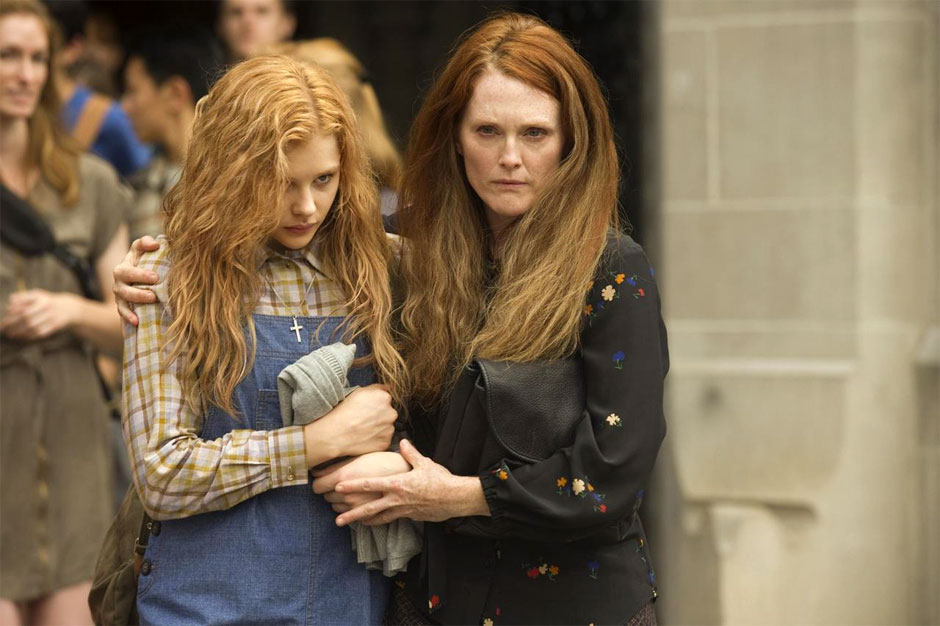I had “Carrie” on my Top 5 Least Anticipated Films of the Fall of 2013...and the movie didn’t prove me wrong. “Carrie” falls short not because you may compare it to the original in your head, but because the film lacks heart and depth. Kimberly Pierce’s decent attempt at stylishly re-imagining this film can’t gloss over the poor character development and script.
Carrie White (Chloe Grace Moretz) is a timid girl and an outcast amongst her peers. It’s not her fault. Her mother Margaret (Julianne Moore) sheltered her, home-schooled her and tried to indoctrinate Carrie with her own twisted and manipulated version of the Bible. That’s just the problems she deals with at home. At school kids make fun of her because she can’t serve a volleyball, had her first menstrual cycle and didn’t understand what was happening, and reads strange poetry in class. Maybe I’m out of touch, but aside from the period...there’s nothing strange or funny about that. (The period isn’t funny either, but I get how teens may laugh at that.) Hollywood once again tells us who the mean girls are yet forgets to give the mean girls a substantive reason as to why they are mean girls. Alas, I’ll go along with it.
After years of being on the outside, and a day or two after her ascent into womanhood was put on Youtube for the world to see, Tommy Ross (Ansel Elgort) asks Carrie to the prom. Who’s Tommy Ross? Tommy is Sue Snell’s (Gabriella Wilde) boyfriend. You know, one of the mean girls who were making fun of Carrie in the beginning of the movie. She is actually the only one to have a change of heart about bullying and truly want to do something kind for Carrie. Offering her boyfriend as a prom date is that kind act. Even though Carrie is skeptical, the thought of the one “magical” night everyone talks about at school allows her to erase all of those bad memories and decide to accept his offer. Wait. What? Outcast, and indoctrinated Carrie decides to take a chance on a guy that has barely even talked to her? The only connection prior to this is kind of sticking up for her in class, but they didn’t even talk in that scene. It’s the writing that forces “Carrie” to fall short. The movie constantly marches forward to get to the climax with no regard to logic or building most of the main characters into something more than a two dimensional stereotype.
So what was good about the film? I’ll give Kimberly Pierce credit for giving the remake a visually appealing and atmospheric depth. Shooting through a warped window to show Margaret approaching, or showing Carrie fearfully watching each car that passes by in hopes that her mother won’t see her talking with a boy helps us get into the film on a subconscious level. Unfortunately, style can’t always defeat a mediocre script. Pierce also tries to touch on bullying and showing how far bullies can go in today’s times. Cyber bullying makes tormenting a 24/7 issue and not just during the time you’re at school. Although, the script is obviously preachy at times on the subject it’s great that a movie like this can touch on it and perhaps spark dialogue.
Julianne Moore gave depth and owned Margaret in a way that Piper Laurie did but short of an Oscar nod. Chloe Moretz was miscast in this role. Although she did a great job of dwarfing her normally larger than life, confident persona in films prior; she just wasn’t able to bring the inner conflict and longing for a relationship in the way that Sissy Spacek did. Judy Greer did a wonderful job as Ms. Desjardin, Carrie’s gym teacher, giving her genuine care and concern for Carrie.
It’s hard not to compare De Palma’s masterpiece with this latest film. When you evaluate “Carrie” 2013 on its own you’re left with a flat horror film that’s great for a DVD rental on a Friday night. When you compare it to the 1976 version...burn the film and never speak of it again.
Rating: C



